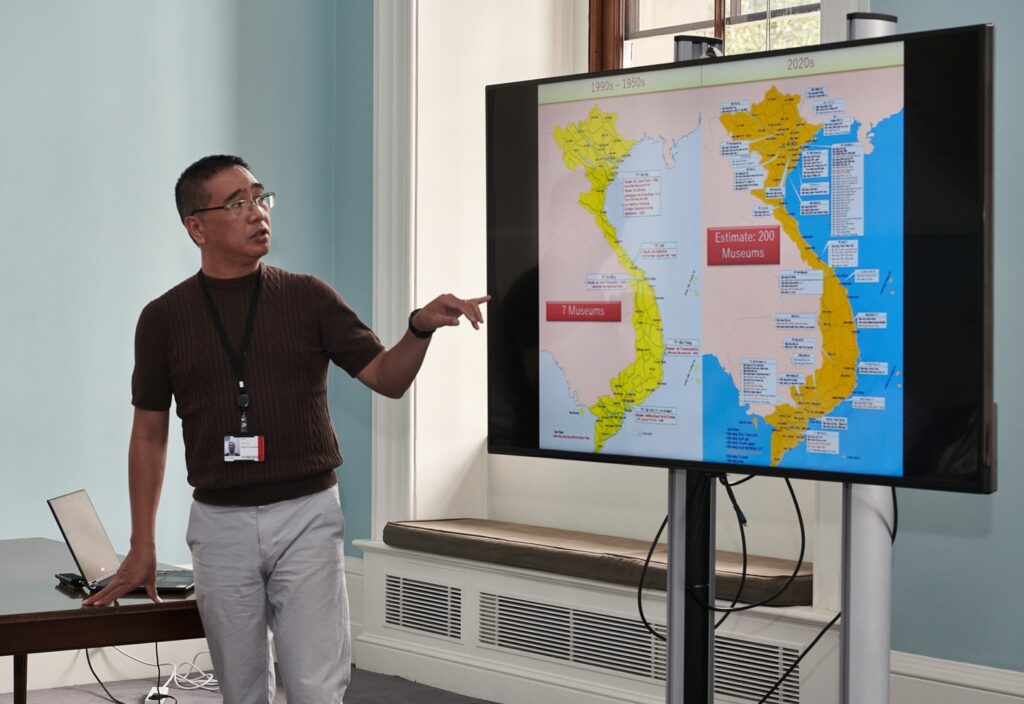New ITP Conference Grant 2025 awarded!!
Written by Claire Messenger, Manager, International Training Programme
We are delighted to award an ITP Conference Grant 2025 to Nguyễn Hải Ninh, Head of Museum and Documentary Heritage Management, Department of Cultural Heritage at the Ministry of Culture, Sports and Tourism (Vietnam, ITP 2023)
Ninh will use his grant to attend and present at the International Conference on the Recovery of Cultural Heritage 2025, Kathmandu, Nepal from 16 to 18 June 2025.

As the Head of the Department of Museum and Documentary Heritage Management, under the Agency for Cultural Heritage, Ministry of Culture, Sports and Tourism of Vietnam, Ninh’s responsibilities include:
- Researching and developing policies for museum activities in Vietnam;
- Guiding and orienting the professional activities of museums across the country;
- Organizing professional training and capacity-building workshops for museum professionals in Vietnam, covering areas such as object collection, conservation, exhibition, and heritage education;
- Developing technical standards for museum operations, such as lighting standards for exhibitions, display case specifications, and conservation requirements;
- Participating as a member of scientific committees for major national museum projects.
Ninh says ‘the repatriation of cultural artifacts, in the context of countries strengthening mutually beneficial cooperation, is a trend that should be actively promoted. Practical experiences, examples, and modern outcomes will help parties better understand one another in fulfilling the shared mission of artifact repatriation’.
At the conference, Ninh will present on Vietnam’s Approach to Artifact Repatriation: Law, Policy, and Cultural Agreements and you can read his abstract below:-
The repatriation of cultural artifacts is becoming an increasingly urgent issue for source countries striving to reclaim their lost heritage—displaced by colonialism, war, illicit trafficking, and unequal exchanges. Vietnam, a country with a rich and diverse cultural legacy, has in recent years intensified efforts to retrieve nationally significant artifacts held abroad. This paper provides an overview of the legal framework governing artifact repatriation in Vietnam, including relevant domestic legislation, bilateral agreements, and the country’s implementation of international instruments such as the 1970 UNESCO Convention.
Beyond the physical return of cultural property, artifact repatriation carries deep symbolic meaning as an expression of national identity and cultural sovereignty. Each successful repatriation not only restores a part of the nation’s heritage but also reinforces Vietnam’s image and spirit as a country capable of protecting its cultural legacy. The process also becomes more effective when countries with shared goals of cultural preservation cooperate and support each other through diplomacy, mutual legal assistance, and information exchange.
By analyzing key case studies and current legal mechanisms, this paper assesses the effectiveness of Vietnam’s practices and identifies legal and practical gaps that hinder successful repatriation. It concludes with recommendations to strengthen legal tools, build provenance research capacity, and promote international cooperation as essential strategies for safeguarding and recovering Vietnam’s cultural heritage in an increasingly interconnected world.
We are delighted to be able to support Ninh this year and look forward to hearing more about his conference experience and sharing his final report with our ITP global network.
